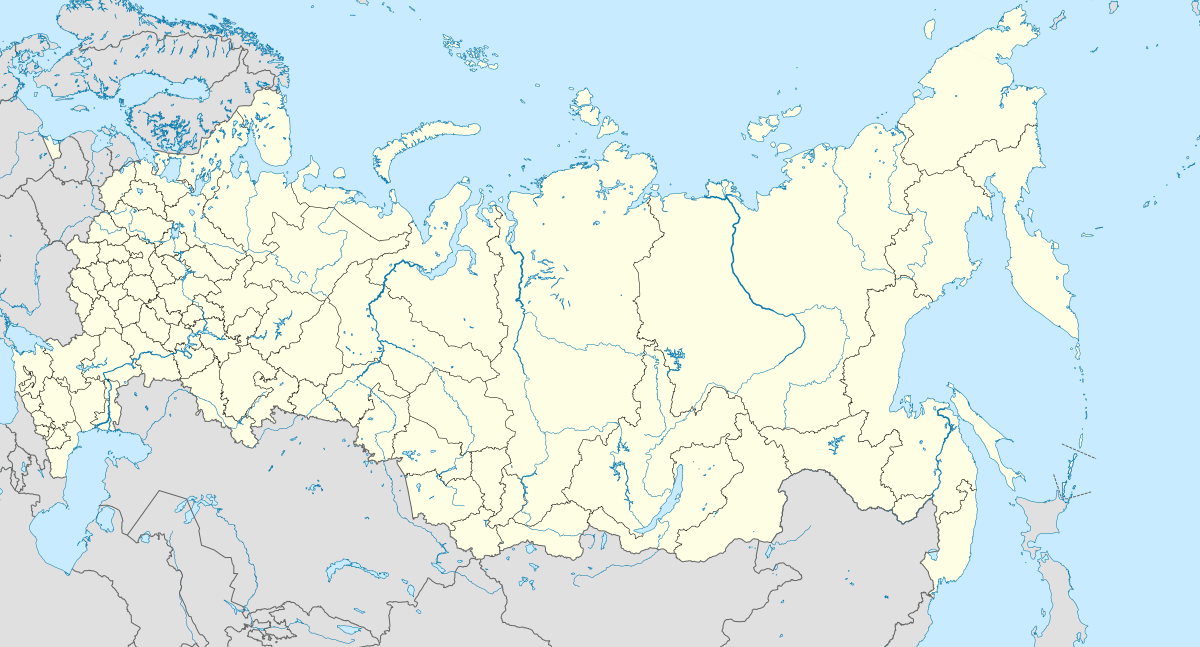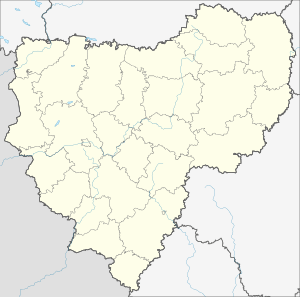Katyn (rural locality)
Katyn (Russian: Катынь; Polish: Katyń [ˈkatɨɲ]) is a rural locality (a selo) in Smolensky District of Smolensk Oblast, Russia, located approximately 20 kilometers (12 mi) to the west of Smolensk, the administrative center of the oblast.
Katyn Катынь | |
|---|---|
Location of Katyn %26groups%3D_f32e2f851a7c80d7f593d84e18ee66c32a392fab.svg)
| |
 Katyn Location of Katyn  Katyn Katyn (Smolensk Oblast) | |
| Coordinates: 54°46′12.32″N 31°41′23.32″E | |
| Country | Russia |
| Federal subject | Smolensk Oblast |
| Elevation | 167 m (548 ft) |
| Time zone | UTC+3 (MSK |
| Postal code(s)[2] | 214522 |
| Dialing code(s) | +7 481 |
| OKTMO ID | 66644436101 |
Geography
It is situated to the west of the city of Smolensk (about 18 km from its center) and circa 60 km from the Russian borders with Belarus. It has a station on the Berlin-Warsaw-Minsk-Moscow international railway line.
History
Before World War I, Gnezdovo with the Katyn Forest belonged to the Koźliński family. In the 19th century, Piotr Koźliński married Leokadia Lefftreu, the daughter of the director of the English railway construction company in Russia. Under the marriage articles Gniezdovo and Katyn became a co-owned by the British.[3]
Katyn massacre
The Katyn Forest, in the vicinity of the village, was the site of the Katyn massacre during World War II, in which thousands of captured Polish officers and other citizens were killed. Despite claims by the Poles, the Soviet Union blamed Nazi Germany for the mass murders and attempted to hide its involvement, going as far as to ban all mention of the Katyn massacre in the USSR. In 1990, Soviet leader Mikhail Gorbachev admitted that the NKVD had executed the Poles and confirmed two other burial sites similar to the site at Katyn: Mednoye and Piatykhatky. A number of earlier mass graves of victims of the Soviet system have also been found there, because Katyn Forest had long been used as an execution site for Soviet citizens.
The NKVD resolved to execute prisoners of war and "members of various counter-revolutionary organisations, former landowners, factory owners, former Polish officers, officials and escapees".[4] In 2004, Polish prosecutors described this as a plan to eliminate in part the "intellectual elite of the Polish Nation", so as "to prevent the rebirth of Polish statehood".[4]
The 2007 Polish film Katyń, directed by Andrzej Wajda, is an interpretation of the events that led up to the mass execution.
Polish plane crash
On April 10, 2010 around 08.56 GMT a Polish government aircraft crashed near Katyn, on Smolensk Military Air Base. Passengers of the Polish-owned Russian Tupolev-154 airplane included Polish President Lech Kaczyński and his wife, Maria Kaczyńska; former President of Poland in-exile Ryszard Kaczorowski; Sławomir Skrzypek, governor of the Polish Central Bank; Andrzej Kremer, Deputy Foreign minister; Piotr Nurowski, President of the Polish Olympic Committee; Jerzy Szmajdzinski, Deputy Speaker of the Sejm, seven army generals and many key political figures. The delegation heading to commemorate the Massacre of Katyn consisted of 96 people, including 7 members of crew. None survived.
The Polish President, Lech Kaczyński was to deliver a speech at the formal commemorations. The speech was to honour the victims, highlight the significance of the massacres in the context of postwar communist political history, as well as stress the need for Russo-Polish relations to focus on reconciliation. Although the speech was never delivered, it has been published with a narration in the original Polish[5] and a translation has also been made available in English.[6]
See also
- List of Polish Martyrdom sites
- Bronisław Bohatyrewicz
References
- "Об исчислении времени". Официальный интернет-портал правовой информации (in Russian). June 3, 2011. Retrieved January 19, 2019.
- Почта России. Информационно-вычислительный центр ОАСУ РПО. (Russian Post). Поиск объектов почтовой связи (Postal Objects Search) (in Russian)
- Tadeusz A. Kisielewski, Zabójcy. Widma wychodzą z cienia, Poznań 2006, p. 40.
- Decision to commence investigation into Katyn Massacre, Małgorzata Kużniar-Plota, Departmental Commission for the Prosecution of Crimes against the Polish Nation, Warsaw 30 November 2004
- (in Polish) Onet.TV Platforma "Słowa które nie padły" Archived April 15, 2010, at the Wayback Machine
- View From The Right "The Speech the Polish President was to give at the Katyn Memorial" (12 April 2010)
External links

- Officiаl site of the State memorial complex «Katyn»